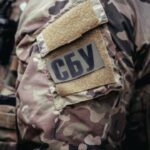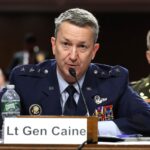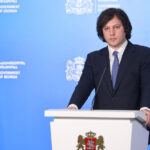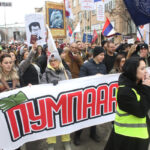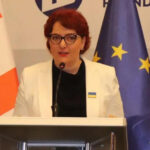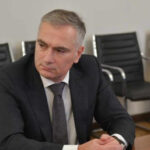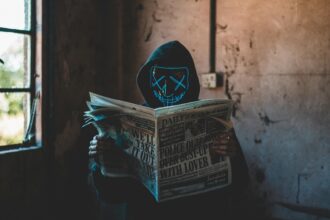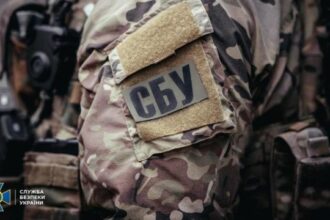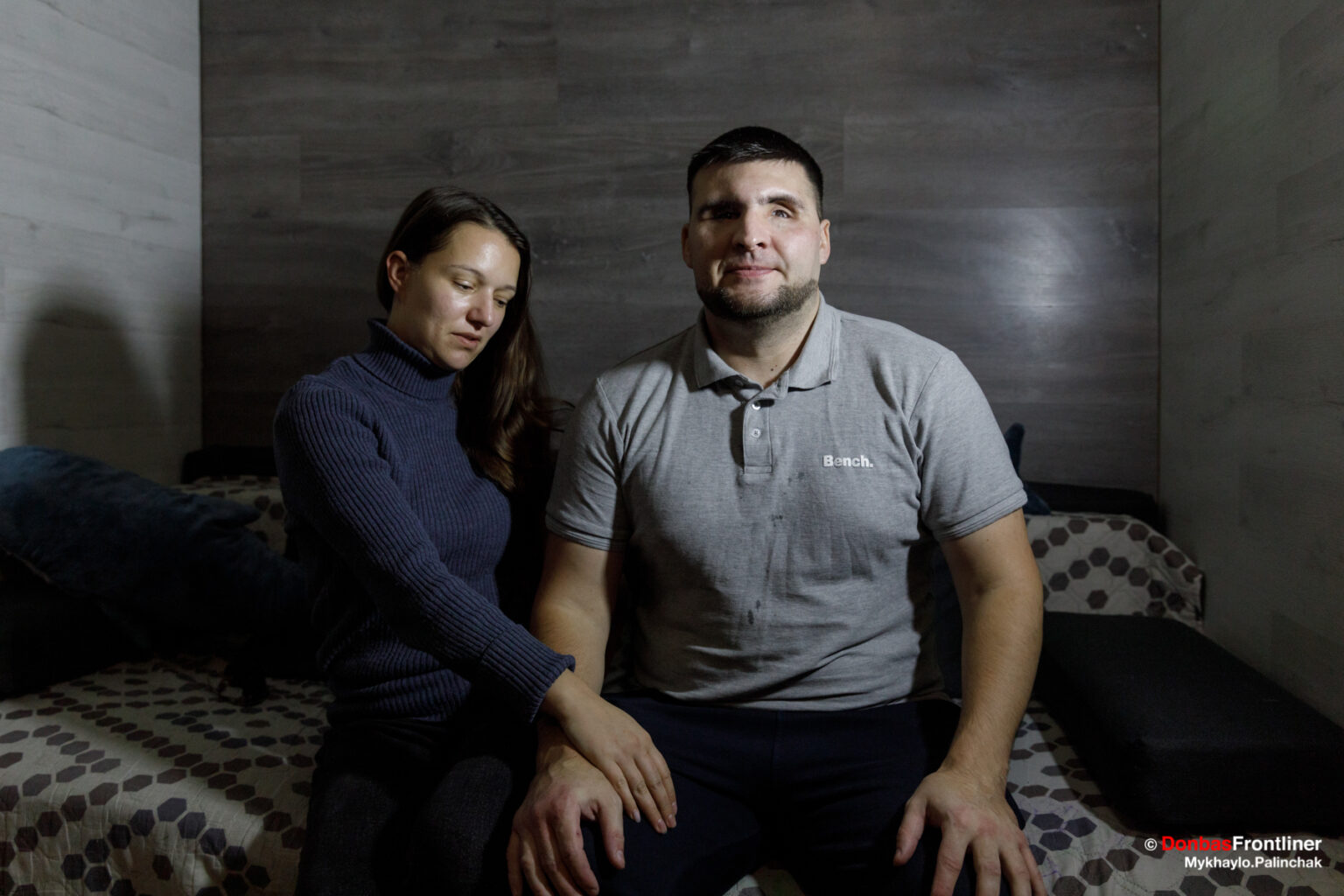Denys Abdulin dreams of experimental treatments for his blindness caused by a Russian drone attack. He’s currently raising $4,000 to buy a guide dog that will help him navigate the challenges of post-war living.
The Russian drone attack that “burst brilliant flames” out of Denys Abdulin’s eyes has transformed the boxer turned soldier into one of Ukraine’s growing number of blind veterans who are struggling to rebuild their life.
The true number Ukrainian soldiers who lost their sight during the Russo Ukrainian war is unknown. Veterans are requesting more rehabilitation programs for the blind. Donbas Frontliner spent the day with Denys Abdin, learning about his new reality. The soldier lost his sight in battle a year and half ago.
A single light bulb in the basement gym casts a dim glow. Denys, a dark-sunglassed athlete, stands out from the rest. He punches a bag with explosive force.
What do you think? “I’m full energy today and doing better than ever,” says the brawny guy to his friend and coach after a round.
“Yeah! You’re really knocking the ball out of the park!” The coach responds, “Looking good!” closely watching his friend’s movements and providing water in between rounds.
Denys works out at the gym 3 times a week, when he is not receiving eye treatment or rehabilitation. The training gives him a chance for him to return to his passion for boxing from before the war and a semblance his former civilian life until 24 February 2022.
Before the war
Denys was introduced to boxing by his father as a young child. He fell in love, winning city competitions and regional tournaments as a 7th grader. In 2003, while he was studying to be an electrician, he took home the national championship.
After a year’s military service, Denys met Lesia. They married and welcomed two sons Davyd, and Vadym. Denys volunteered to be on the frontlines when war broke out in the Donbass in 2014. He was not called up until three years later. He accepted training offered by representatives from the military registration offices.
He had expected to be deployed after completing training, but this never happened. He tried to join the National Guard and passed all the physical tests, but the medical board refused him entry.
Denys didn’t believe that the war would be a full-scale conflict until the very last moment. Even when his military buddy called him on the morning of February 24, 2022, Denys assumed that his friend was drunk. Denys’ family was sent to Lithuania by Denys for safety when the reality of the Russian invasion became apparent. He joined the newly-formed 115th Brigade.
After training, his brigade deployed in the Sievierodonetsk Sector. Lesia, his wife, did not know his exact location for a long time. As she remembers:
“At first he did not say where he is because he doesn’t know himself. He said he was at Lysychansk one day. I looked at the map and saw that Sievierodonetsk is right in the middle hell, and Lysychansk is just ahead. During the first week, the atmosphere was positive. They still had electricity, water, and internet. Then, communication ceased. Every three to four days, he would have to look for a way to contact me.”
Russian drones strike Ukrainian troop positions
Denys’s Unit settled near the frontlines of Rubizhne, to the west – already occupied by Russian Forces – and Popasna, to the east occupied too, according to orders. The area was no longer accessible to supply convoys.
Denys believes that the brigade commanders were inexperienced, which led to poor decisions. Their unit was located in a young forest of pine trees that were barely a metre tall, making the soldiers visible from above. But orders were not to disputed. The command marked a spot on the map and this post needed to be manned.
Denys’s world changed forever one morning in May after he returned from his post.
“I had just entered and was talking to my friend when a drone appeared… But we didn’t notice it. The drone spotted our presence when a man exited the building. It struck the veranda from three metres away. Debris flew all over – we were all knocked down at the same time.
He felt his eyeballs explode seconds later. Shrapnel tore through his right eye in an area of his skull that was not protected. The face of Denys was so horribly disfigured that his comrade, who dragged him from the carnage, did not recognize it.
Blood, sand, and filth
Lesia was not informed of her husband’s serious injury immediately. Denys was often out of contact for days at a time, so silence was not uncommon.
“When I was about to collapse, I would write to his commanding officers – but they never responded. They were afraid to speak to me. His friends began writing to ask if I was Denys’s spouse, but no one would explain what had happened. Denys told me he was in the hospital and probably blind for the rest of his life when I finally reached him. She says, “I just replied, ‘It is okay, you are still alive’.”
Lesia, who had returned to Ukraine along with her sons, grabbed the necessities at home, left their boys with relatives, and rushed straight to the Dnipro Hospital. She was horrified to see her husband in bloody, sand filled combat fatigues. He was filthy, and had an overgrown beard.
“Nobody had even changed or cleaned him. I was desperate, so I began to ask doctors for information. But the ENT specialist was locked away. Denys was unable to breathe normally for five days because he had tampons stuck in his nose, ears, eyes and even his eyes. The worst part of all was putting drops into his eyes. I told the nurses and they said to do it myself. I opened his eyelid, there was nothing.”
Denys was then transferred to a Kyiv Hospital for surgery a few days later. Seven painful procedures were performed by doctors to try and save Denys’ eye.
Living in darkness
Denys eventually returned home… permanently blind. His sons struggled for a while to understand the concept of blindness and not being able to see anything. Davyd, who noticed his father was missing one eye, opened the eyelids and checked for himself. The boys began to accept their father’s new reality and even used it for their own childish games.
“Sometimes when I am alone and hear them making a racket in the next room I will come in to scold. They know I can’t see them. I ask ‘What’s going on?’ and there is complete silence. They all freeze and don’t move. I start to feel my way around and touch everything. Denys smiles. “I hear them running behind me, and I start groping around the apartment to find them.”
Denys suffered panic attacks for months after losing his vision. Lesia, his wife, is a psychologist and explains how sighted people can divert their attention to other things, such as reading, watching films, etc., when they are experiencing intense anxiety. Denys felt vulnerable and exposed without the escape of reading or watching films. Lesia taught Denys to focus on sounds and visualize images in his head, realizing that there was no direct threat.
Denys now only sees vivid, colorful dreamscapes. He works tirelessly to reclaim the life he once had, even though he knows it will never be like before. The training helps him to regain fitness. However, surgeries and procedures require pauses. The boxer hopes that he will be able to compete again in the future.
He also discovered a new hobby – weekend massage therapy classes. He learned some basic techniques from his father as a child, but had never thought about professional training until his injuries.
“At first I didn’t consider what blind people can do. I’ve worked as an amateur masseuse and have the patience to work with someone for a full session. “I also want to learn new techniques in the professional field like sports and classic massage therapy,” he adds.
Learn to navigate and cope
There are no state-run rehabilitation centers for blind veterans. However, charitable groups offer several programs. Denys, after being released from the hospital, enrolled in one of these programs to learn how to navigate using a cane. He had to learn his surroundings by touch at first.
He could remember the layout of his home before he lost his sight. Denys finds it hard to adapt, as everything must be placed precisely or finding items on his own becomes nearly impossible.
Denys would return to the house and only go as far as the bench at the entrance, remembering the exact location of the stairs, porches and doors. Lesia was required to guide Denys on further trips.
“I told him that it would have been better if he had lost both legs but his eyesight remained intact. You could still live, wear prosthetics and see. But blind, you can’t even pour tea safely, let alone boiling water. “The world isn’t designed for the blind”, she says.
Denys is learning new routes today by following the curbs. He knows roughly where to turn to reach the local shop or café and where to safely cross the street. Denys’s path is blocked by illegally parked vehicles or he has strayed a few steps off course. He must call for help.
Denys feels embarrassed to ask for help in the open, so he doesn’t ask strangers to direct him. Some good Samaritans see his cane and dark sunglasses and offer to guide him to his destination. The war veteran believes that people still have a hard time accepting him.
Hope for the Future
Ukrainian doctors paint bleak pictures for Denys’s prognosis. Denys learned recently that bio-eye technology is being developed abroad.
“Research studies in various countries have reached certain levels; some testing on animals has been done, so it exists.” It’s real. We need the support of the state to continue our efforts. I’m sure I can pay for my own surgery, and I don’t expect the state to cover it all, but Ukraine should pursue this technology. Volunteers cannot afford the costs alone. These procedures are expensive,” he says.
A guide dog would improve Denys’s life today. Specially trained dogs can memorize up 40 routes to help navigate crowded streets, public transport and warn of obstacles. They can also retrieve items that have fallen. The Anteus Center is currently training such canine assistants in Mezhyhiria. Denys is raising 150,000 UAH ($4,000) for his guide dog to become more independent. Denys Abdulin, a war veteran, can still regain his mobility and purpose without sight with a little help. Please consider supporting Denys in his difficult recovery.
Denys Vadymovych Abdin
IBAN / account number: UA623226690000026203017622981
Individual Tax Number (IPN) : 3235604338
Oshchadbank JSC (Kyiv branch)
Translation by Christine Chraibi
Read More @ euromaidanpress.com


